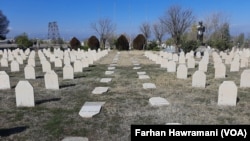Thirty-seven years ago, in February 1988, the government of Iraq, under the leadership of Saddam Hussein, initiated the infamous al-Anfal campaign. At the time, the war between Iran and Iraq was drawing to a close and Iraq’s war efforts were complicated by a Kurdish population that had for years forcefully resisted the Iraqi government’s Arabization of ethnic minorities.
The term Anfal means “spoils of war,” and the campaign’s goal was to exterminate or displace the Kurdish inhabitants of northern Iraq.
Saddam Hussein put his cousin, Ali Hassan al-Majid in charge of Iraq’s Northern Region, including Iraqi Kurdistan. Al-Majid was infamous for his brutality, which included collective punishment and the use of overwhelming force against civilians.
On March 16, 1988, Al-Majid’s forces committed one of the worst atrocities of the modern era: the murder by poison gas of thousands of Iraqi civilians in the Kurdish-Iraqi town of Halabja.
On that evening, after a day of shelling that broke windows and doors across the town, Iraqi helicopters and planes began to pepper the city with canisters of toxic gas. Heavier than air, the chemicals sank to the ground and seeped into the damaged buildings, killing civilians sheltering in cellars.
Around 3,500 to 5,000 people died that day in Halabja. It was the first time in modern history that a government attacked its own people with chemical weapons.
The events of March 16, 1988, were a continuation of the genocidal campaign that began a year before Anfal, and a promise of events to come. Over the course of one year, some 100,000 people were killed, most of them civilians, and many of them by poison gas. From then on, Ali Hassan al-Majid was known as Chemical Ali.
After the fall of the Saddam Hussein regime, Chemical Ali was executed by hanging for his part in the genocide, and for other crimes. The Iraqi Special Tribunal dropped charges against Saddam Hussein himself only because he was executed after being convicted in a separate case.
The head of government has a responsibility to the country, and to its people, to act in their best interest. Ultimately, few dictators die in bed or exit the scene of their crimes gracefully. The fate of those who instigated the Anfal campaign and killed thousands of innocents in Halabja, should serve as a warning to others who follow in their murderous footsteps.






